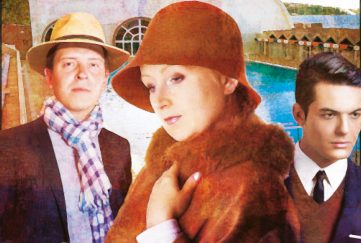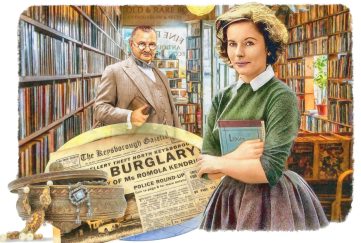A Quiet Honeymoon – Episode 05

MR GREVILLE sent a servant to ask Ruth and Terence to visit them the following day.
Your presence calmed my daughter, he wrote in his note. If you are agreeable, I might also distract myself from all this by talking over my Oxford days with you, Mrs Greene, you who have been there so lately. Please come for luncheon.
Mr Philip Young was at the house when they arrived. He was a well-spoken, intelligent man of thirty who obviously adored Mary Greville. And soon afterwards another lady was announced.
“Ah, this will be Madame Dubost,” Mr Greville said, leaping from his chair. The maid showed in a woman of about forty, with very dark hair and eyes, wearing an elegant dress and hat.
Mme Dubost shook hands with them all.
“Mme Dubost is a good friend,” Mr Greville said, holding out a chair for her. “We met her at the home of my friend, Sir Vincent Brody, owner of the neighbouring land. She is a teacher of the violin.”
“Matthew,” she said as she sat, her soft voice accented with French. “Mary. Philip. I have learned what has happened to Mr Quirk. It is terrible. I cannot believe it.” She reached behind her and laid a long-fingered hand on Mr Greville’s hand. Ruth saw his body relax at her touch.
They tried not to talk of the murder, but it was impossible.
“I am afraid that I think it likely,” Terence said carefully, “that Mr Quirk died, not in the lane, but inside your property.”
Mary gasped.
“Oh, no, that would be dreadful,” she said. “Who could get inside our home and ?”
“Mary,” Philip Young interrupted gently. “Nothing is certain. Don’t distress yourself. The police will find it all out.”
“But I thought I heard sounds in the house,” Mary said. “They said, Mr and Mrs Greene, that poor Mr Quirk died the night before you found him. That evening, I am sure I heard something when I was reading.”
Mme Dubost’s face, full of concern, turned to Mary.
“But, my dear, the house is surely not large enough for a person to enter unheard, unseen.”
Mr Greville nodded.
“I cannot see how an intruder would not be discovered by the servants. Henshaw sleeps below the hall, and he complains of the rattling boards when anyone arrives! He says he never misses an unexpected guest because of it! The back door and the windows that are low enough are all within the hearing of Johnson and the maid.”
“I suppose so,” Mary said, wringing her hands. “The police have questioned all our servants,” she said to Ruth. “It was horrible. Even Henshaw, who has served father for twenty years before I came! They have all been here for many years.”
Terence stood and walked to the French doors.
“So the archway is the only other way in, at least to the garden, besides well-watched front and back doors? And Mr Quirk was supposed to be in the house on that day anyway?”
Mr Greville stood.
“He comes and goes, Mr Greene. He has had the run of the house. That is what makes it hard to find out what happened. Nobody would be surprised to see him here.”
“There is another entrance to the garden,” Mme Dubost said, “behind the vegetables.”
Terence asked to see it, and Philip Young led him outside. The second gate, at the end of rows of herbs, led on to the road.
“Look,” Terence said, running a finger along the join between lintel and wooden door. “Cobwebs galore. It’s not been opened in a long time.”
“I don’t suppose there is reason to open it,” his companion said. “It’s too close to the traffic, now more and more horses come along here.” He laid a restraining hand on Terence’s arm. “Mr Greville tells me that you and Mrs Greene have experience of solving crime,” he said. “Will they find whoever did this?”
“I fervently hope so,” Terence replied. He looked at the neat rows of lettuces. “I wonder, Mr Young, if you can explain a remark that Miss Greville made?”
“Anything,” Philip said.
“Miss Greville said that the butler had served before she came here. It is an odd choice of phrase.”
Philip sat on a low wall.
“It’s no secret,” he said. “Matthew Greville was born here in 1874. His parents were harsh people Victorians of a certain sort, if you understand me. Greville fell in love with a servant called Sarah Francis. It was a foolish thing to do weak, perhaps, but I believe he was unhappy at this house, and that sent him into her arms. He married Sarah in secret. His father, a man of influence, had his son (though then twenty-three), sent to serve in the ’ninety-six Matabeleland Rebellion. You remember it?”
“I was a very small child,” Terence said. “I remember the name.”
“He came home two years later,” Philip Young continued, “by which time the girl, and the child he knew she was carrying, had vanished. Or rather, they had been removed by Matthew’s parents. His father told him poor young man that they had utterly convinced Sarah that Matthew rejected her. They had even made her believe that their marriage was a sham. They named to her some ‘respectable’ woman, saying that Matthew intended to marry her. When my friend came home, it was made clear that Sarah Francis had gone. For ever.” Mr Young looked at the mellow walls of the old house. “It is a comment on my friend that he never married again. He looked for Sarah, but in the end concluded that whatever name they had made her take, he would never discover it.”
“So who is ?”
Philip stood up, and smiled suddenly, an expression of delight.
“Mary is their child. She came here nine years ago, a beautiful thing even then, at the age of twelve, and so like her mother in appearance that Matthew knew at once. Sarah, you see, had cherished great anger. You can see,” he said with enthusiasm, “the determined woman that she was, in the character of her daughter. Sarah did not look for Matthew Greville. She made a life in Edinburgh as a laundress, calling herself a widow.
“Then Sarah discovered she was dying. She saw that her long-held anger was useless to Mary and to her peace of mind. She told Mary about her father in Sussex and sent her, now she was old enough to go, to Brakenham. She wanted to see if Matthew Greville was still there, and if he remembered her, and what might be done for their daughter, now that little Mary would soon be alone in the world. Of course, Matthew sent for Sarah immediately.” He shut his eyes for a moment.
“But Sarah died while her daughter was here in Sussex. Father and daughter travelled to Scotland for the funeral. Mary stills speaks of it. She told me of the tiny chapel on the outskirts of Edinburgh. Her father’s pain, she says, and his feelings of loss after all those years, will never be forgotten.”
















